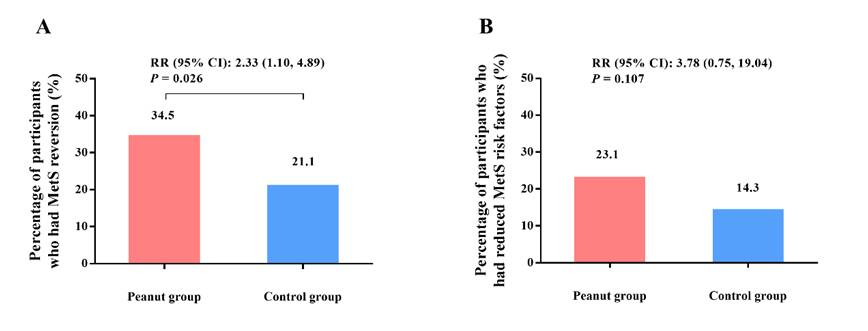Replacing White Rice Bars with Peanuts as Snacks in the Habitual Diet Improves Metabolic Syndrome Risk
Peanuts are rich in unsaturated fatty acids, protein, fiber, phytosterols, and other bioactive compounds. As one of the most affordable and abundant type of nuts available in markets, peanuts are culturally acceptable in many parts of the world.
Observational studies suggested that intake of nuts was associated with lower risk of cardiometabolic diseases while refined grain consumption has been linked to higher risk. Little is known about whether substituting white rice, a refined grain, with peanuts could confer benefit among adults at high risk for cardiometabolic diseases.
For the first time, a recent study shows the effects of substituting peanuts for an isocaloric white rice–based snack on metabolic syndrome (MetS) reversion. The research was led by Prof. LIN Xu at the Shanghai Institute of Nutrition and Health (SINH) of the Chinese Academy of Sciences, in cooperation with Huadong Hospital Affiliated with Fudan University.
Researchers recruited 224 participants either with MetS (the International Diabetes Federation criteria for Chinese adults, n=163) or at MetS risk (central obesity plus one additional MetS risk factor, n=61). Participants were randomized to either the peanut group (n=113) or the control group (n=111) and they daily received either two packs of roasted lightly salted peanuts (28g per serving/packet), or two packets of energy-matched white rice snack bars (1392 kJ/d, ~20% of daily energy intake) for 12 weeks. Any remaining intervention foods were weighed and recorded by the study team. All participants were advised to maintain their habitual diet (aside from the intervention foods) and physical activity levels.
Interestingly, after the 12 weeks trail, researchers found that the relative risk (RR) of MetS reversion rate (having MetS at baseline but no longer meeting the criteria after the 12-week trial) was significantly higher in the peanut group than the controls (RR 2.33; 95% CI: 1.10, 4.89; P = 0.026) . And the peanut group also tended to have a higher RR for a reduction in MetS risk factor counts by 1 or 2 in those with high MetS risk (RR 3.78; 95% CI: 0.75, 19.04; P = 0.107) than those in the controls .

MetS reversion rate and percentage of participants with reduced MetS risk counts after the 12-wk intervention. (Image provided by Prof. LIN Xu's group)
(A) MetS reversion rate at week 12 among participants with MetS at baseline (peanut group, n = 87; control group, n = 76). MetS reversion was defined as participants with MetS at baseline who no longer met the criteria for MetS after the trial.
(B) Percentage of participants with MetS risk factor counts reduced by 1 or 2 at week 12 among participants with MetS risk at baseline (peanut group, n = 26; control group, n = 35).
Furthermore, the participants had peanuts did not gain weight although peanuts are generally considered as an energy dense food with a high fat content.

Changes in weight of participants during the trial. Peanut group, n = 113; control group, n = 110. Body weight data were missing for 1 participant in the control group owing to a recording error at week 12. (Image provided by Prof. LIN Xu's group)
Collectively, including peanuts as a snack in the habitual diet to replace a refined grain snack may improve overall cardiometabolic health without promoting weight gain among high risk Chinese adults.
This work entitled "Replacing white rice bars with peanuts as snacks in the habitual diet improves metabolic syndrome risk among Chinese adults: a randomized controlled trial" was published online on The American Journal of Clinical Nutrition on Nov. 24, 2020.
This study was led by Professor LIN Xu, and mainly conducted by Ph.D. candidate WANG Di, and Associate Professor SUN Liang at SINH, collaborated with Vasanti Malik as the co-corresponding author; and with LIU Xiaoran as the co-first author in the Harvard T.H. Chan School of Public Health.
The Chinese Academy of Sciences provided major funds, and the Peanut Institute and National Peanut Board provided part of funds and also the peanuts used for the trial. None of the funders had a role in study design, implementation, data analysis or interpretation, or manuscript writing. The white rice bars were manufactured by Zhejiang Nutriease Health Technology Co. Ltd.
Media Contact:
WANG Jin (Ms.)
Shanghai Institute of Nutrition and Health,
Chinese Academy of Sciences
Email: sibssc@sibs.ac.cn
